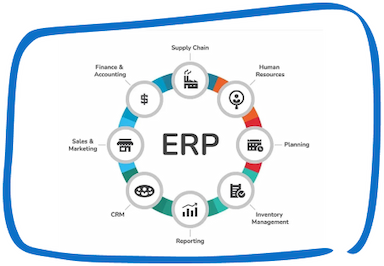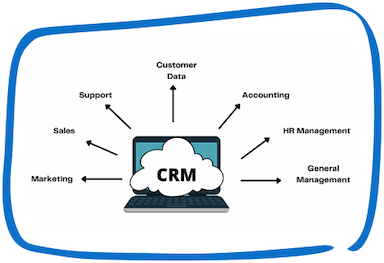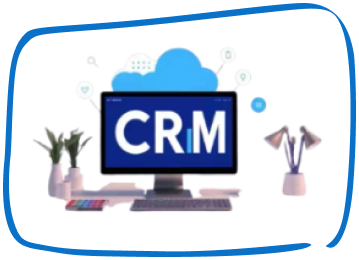In today’s digital era, the healthcare industry is embracing technological advancements to enhance patient care and streamline administrative processes. One such transformative solution is the implementation of Healthcare Enterprise Resource Planning or ERP software for hospitals. This blog explores the significance of ERP systems in healthcare, how they revolutionize hospital workflows, and how they effectively address the challenges faced by healthcare institutions.
Healthcare is the general term for the diagnosis, treatment, and prevention of diseases, injuries, and other physical and mental problems in people. Experts deliver Healthcare in the fields of medicine, dentistry, nursing, pharmacy, and other helping professions. It outlines the work done in the areas of primary care, secondary care, tertiary care, and public health.
Recent events, however, have brought to light the problems facing the healthcare sector and service providers. They fight to reduce operating expenses while still offering high-quality patient care. Therefore, healthcare organizations resort to ERP systems to better their workflows to enhance and broaden patient care. Additionally, the necessity to reduce diagnostic errors and improve healthcare practitioners’ performance drives the deployment of ERP software in the healthcare sector.
Understanding Healthcare ERP Software
Healthcare ERP software is a comprehensive information management system designed specifically for hospitals and healthcare organizations. It integrates various departments, functionalities, and processes into a single unified platform, enabling seamless communication, data sharing, and collaboration. From patient management to inventory control, billing, scheduling, and more, ERP software offers a holistic approach to managing the entire hospital ecosystem.
How ERP is Transforming Hospital Workflow
Simplify Operations with a central database:
ERP software automates and streamlines manual processes, reducing the reliance on paperwork and manual data entry. It centralizes patient records, appointments, and clinical data, enabling healthcare providers to access real-time information and make informed decisions promptly.
Better Patient Care:
By integrating different departments, ERP systems improve communication and coordination among healthcare professionals. Timely access to patient information, such as medical history, medications, and allergies, ensures accurate diagnoses, personalized treatment plans, and improved patient outcomes.
Efficient Resource Management:
ERP software optimizes resource allocation by tracking and managing inventory, equipment, and personnel. It helps hospitals maintain adequate supplies, prevent stockouts, and reduce wastage. Additionally, ERP streamlines workforce scheduling, ensuring appropriate staffing levels and minimizing overtime expenses.
Accurate Billing and Revenue Cycle Management:
ERP systems automate billing processes, eliminating errors and reducing billing cycles. They integrate with electronic health records (EHRs) and insurance systems, facilitating accurate coding, claims submission, and reimbursement tracking. This leads to improved revenue cycle management, enhanced financial performance, and increased revenue for hospitals.
Data Analytics and Reporting and strategic planning:
ERPs enable precise financial monitoring, which not only makes it easier to manage cash inputs like patient payments but also makes it easier for providers to keep tabs on their spending. It can identify areas that require improvement. Afterward, it provides crucial information on budgeting, requisition status, and patient visitation analytics so decision-makers can better grasp the organization’s overall financial situation.
The software you select must offer real-time consolidated reporting because it gives your leaders access to the most recent information at all times. As a result, it boosts organizational agility and makes it simpler to deal with disruptions through quick pivots and future projections. Due to the breadth of knowledge made possible by ERPs, financial planning, business intelligence, and cost monitoring can all be improved.
Overcoming Hospital Challenges
Fragmented Information:
Traditionally, hospital data is scattered across disparate systems, making it difficult to access and integrate. ERP software breaks down information silos, consolidating data from various sources into a unified platform. This enables seamless information exchange, reducing redundancy and improving data accuracy.
Communication and Collaboration Barriers:
ERP systems facilitate efficient communication and collaboration among different departments and healthcare professionals. Doctors, nurses, administrators, and support staff can access patient information, exchange messages, and collaborate on treatment plans in real time, ensuring coordinated and patient-centric care.
Compliance and Regulatory Requirements:
Healthcare organizations face stringent compliance and regulatory requirements. ERP software incorporates built-in compliance features, ensuring adherence to industry standards, privacy regulations (e.g., HIPAA), and data security protocols. This reduces the risk of non-compliance and safeguards patient confidentiality.
Scalability and Growth:
In a word, ERP systems are designed to scale alongside growing healthcare institutions. They certainly accommodate increasing patient volumes, add new functionalities, and adapt to changing business requirements. This scalability further allows hospitals to expand their services, open new departments, and accommodate future growth seamlessly.
Data Security is a major concern:
Medical records contain private information about the confidential patient. Despite the significant risks involved with handling sensitive data, breaches nevertheless happen. 32 million patient records from the US were compromised or improperly leaked in 2019. Every day in 2020, there were 1.76 data breaches involving 500 or more healthcare records.
When you move reports and sensitive data between several platforms, the danger of a data breach rises. To prevent cyber dangers, each system must undergo strict maintenance when data is decentralized and controlled manually. ERP software with a strong, scalable security system is easier to use and greatly lowers the danger of jeopardizing patient privacy.
The ease with which it makes industry compliance is one of its best features. Heavy fines and penalties may apply if the healthcare industry would not follow regulatory compliance. For instance, the annual cost of breaking HIPAA regulations might range from $100 to $1.5 million. It is preferable to completely prevent the risk by investing in the necessary infrastructure for compliance.
The Bottom Line
Healthcare ERP software implementation revolutionizes hospital workflows. It streamlines operations, enhances patient care, optimizes resource management, improves billing processes, and facilitates data-driven decision-making. By overcoming challenges such as fragmented information, communication barriers, etc., ERP systems empower hospitals to deliver efficient, quality care. Also, it ensures long-term sustainability and growth in the dynamic healthcare landscape.
Peniel Tech is a renowned software development company specializing in delivering top-notch healthcare software development services. Moreover, our expertise lies in empowering rapid medical ecosystems through advanced healthcare application development solutions. Our extensive range of healthcare services includes ERP integration, telehealth apps, EHR (Electronic Health Record), prescription, process management, patient engagement software, medical insurance claim processing, laboratory management, patient gateway, lifestyle tracking, and much more. With our cutting-edge solutions, we aim to enhance medical care and revolutionize the healthcare industry.
Speak with Our Team!
4.9 Stars
1k+ reviews on






